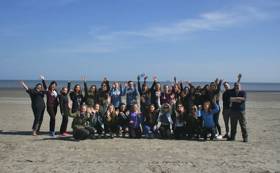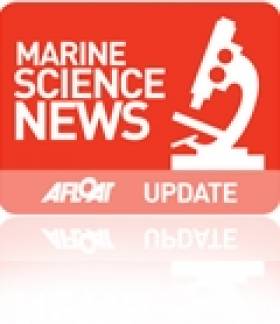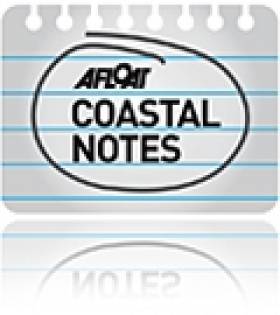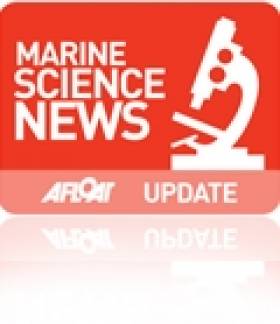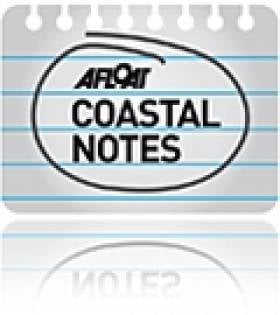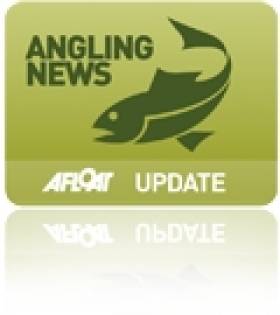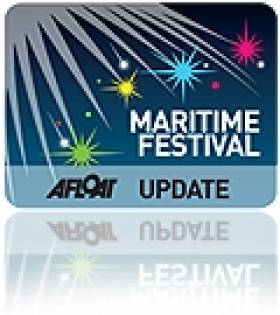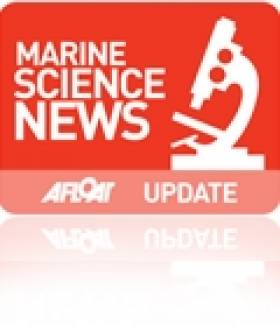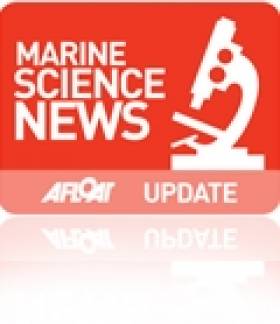Displaying items by tag: education
#InlandWaters - Waterways Ireland completed the first week of its pilot 'Water Project' for post-primary schools last Friday 30 September.
Ninety students and teachers from four second-level schools in Co Fermanagh are engaged in water-based learning activities on Lough Erne as part of the two-week pilot educational project which concludes tomorrow (Friday 7 October).
Pupils and teachers from St Fanchea's College, St Aidan's High School, Devenish College and St Joseph's College undertook the two-day programme at Waterways Ireland's headquarters in Enniskillen, where they took part in biodiversity workshops and discovered some of the many fascinating water-based creatures, birds and aquatic plants that exist along the shoreline of Lough Erne.
They also rowed a 33ft currach in the Bronze Age style, and learned the techniques of angling, before diving into kayaking and a heritage workshop in Fermanagh Castle Museum earlier this week.
Initial feedback from both students and teachers has been positive, according to Waterways Ireland, which adds that at the end of the two-week pilot all feedback from partners and participants will be gathered to inform an evaluation report and future development of the project in the months ahead.
The Water Project has been developed and implemented in partnership with Row the Erne; Erne Paddlers; Inland Fisheries (DAERA) and the National Coarse Fishing Federation of Ireland; Fermanagh Castle Museum; RSPB and the Ulster Wildlife Trust.
Waterways Ireland has ongoing educational work with primary schools centred on the waterways. The Water Project aims to promote awareness and knowledge of the importance of Lough Erne and access to its many recreational activity opportunities for secondary students.
Bringing The Ocean Into The Classroom
#MarineScience - Dublin City University's St Patrick's Campus and the Marine Institute ran a pilot marine module with over 40 student teachers this week, giving them an opportunity to learn about teaching marine science and Ireland’s marine heritage.
Marine Institute chief executive Dr Peter Heffernan welcomed the collaboration with DCU to introduce themes relating to the marine environment into the science module.
“We recognise the unique position teachers have to help students develop an understanding of our amazing ocean resources," he said. "We hope these teachers will inspire curiosity among their students to learn more about the ocean and to develop an understanding of how we influence the ocean and how the ocean influences us.”
With a focus on a 'Marine Day' on 20 April on campus and in and the wider university, the oceans, seas and shorelines around Ireland present many opportunities to introduce marine themes into a range of cross curricular lessons,” explained Dr Thomas McCloughlin lecturer and lab manager of science at DCU's St Patricks Campus.
The Marine Institute provided a saltwater aquarium as well as a tidal tank for the modules, showing how bringing the seashore to the class provides an exciting way to learn about marine animals typically found on the seashore.
The programme was delivered to over 40 second- and third-year student teachers and included a field trip to the seashore and a range of interactive presentations in class.
“Student teachers get to explore the seashore through field trips as well as analysing specimens through examination and dissection in class. This allows them to integrate examining the biological themes of the marine as well as introducing social, physical-human and geographical influences relating to understanding and ocean resource,” said Dr Noirin Burke of the Galway Atlantaquaria, representing the Marine Institute’s primary school Explorers Education Programme.
Ireland has a seabed territory of approximately 880,000 sq km, 10 times greater than the size of the island of Ireland, making this one of the largest maritime member states of the European Union.
“Therefore, with Ireland being responsible for such a significant ocean resource, it is considered fundamental to teach Irish children, particularly as we are an Island nation, the historical and cultural values as well as the geographical and scientific backgrounds of our marine environment,” said Cushla Dromgool-Regan, responsible for the strategic development of education at the Marine Institute.
The pilot is supported by the Marine Institute and the Explorers Education Programme, which aims to build on Ireland’s marine and maritime heritage by increasing awareness of the value, opportunities and social benefits of our ocean wealth and identity.
The pilot was supported by Explorer Education Centres, Galway Atlantaquaria, Blackrock Education Centre and Sea Life Bray. For more information about the Explorers Education Programme see www.explorers.ie.
Explorers Programme Opens To Northwest Region Primary Schools
#MarineScience - Applications for the Explorers Education Programme are now open for primary schools in Galway, Clare, Mayo and Sligo that wish to take part in marine-related activities and workshops for the 2014/2015 school year.
“With over 50 primary school groups participating in the revised programme last year in Galway, we are delighted to announce the revised modules are now also being offered in Counties Clare and Mayo," said Explorers education officer Dr Noirin Burke, who added that "with support from Sligo Education Centre, we are also extending a pilot programme of Explorer workshops to be held at the centre.”
The new module system allows for more students and teachers to get involved in marine projects, seashore safaris, having aquariums in the class, or taking part in a number of exciting marine workshops involving maths, engineering and science.
Teachers can send their applications to their local educations centres in Counties Galway, Clare, Mayo and Sligo highlighting how the Explorers Education Programme will be beneficial to their class, school and community.
The modules include:
- Explorers Aquarium in the Classroom: This involves students running a saltwater aquarium of native species for up to four weeks in their classroom.
- Explorers Marine Project: Students will learn about materials and energy and forces, using the theme of 'the marine and our ocean'.
- Explorers Seashore Safari: Accompanied by the Explorers education officer, the students will visit their local shoreline to examine the plant and animal life present and their adaptations to life.
- Explorer Workshops at Galway Atlantaquaria: Workshops will be carried out at Galway Atlantaquaria between October 2014 and February 2015, which include maths, engineering and science.
There is also a module for primary schools in Co Sligo. whereby Explorer workshops will be carried out at Sligo Education Centre by the Explorers education officer, introducing students to the marine through experiments and hands-on activities.
For more information about the modules and workshops, please see the Explorers Marine Education Programme Application Form. For further queries contact Dr Burke at [email protected].
The Explorers Education Programme continues to run in Dublin and Cork in association with Blackrock Education Centre, Sea Life Centre Bray and the Lifetime Lab Cork. More information about their workshops will be issued later in the year.
Explorer teaching materials are available to download free of charge at www.explorers.ie
'Surfers Against Sewage' Tour Hits Northern Ireland Next Week
#COASTAL NOTES - Surfers Against Sewage will be taking their environmental education programme to Northern Ireland next week, as online surfing magazine Drift reports.
The team are set to visit up to 15 schools, universities, youth groups and sports clubs in coastal communities across Scotland and Northern Ireland in a whistle-stop five-day tour from 1-15 October.
The sessions will give all involved information on the threats facing their local beaches and coastlines from littering and pollution, and what action students can take against them.
Lessons cover Surfers Against Sewage's campaigns on sewage pollution, marine litter, climate change, toxic chemicals, shipping and wave protection - and feature and interactive environmental board game called Marineopoly where students can put into practice what they've learned.
Drift has more on the story HERE.
Places Open On Science@Sea Training Courses for Marine Students
#MARINE SCIENCE - The Strategic Marine Alliance for Research and Training (SMART) has opened the call for applications for Science@Sea research vessel-based training courses aimed at students of marine-related sciences.
Science@Sea courses have been running since 2008 and are recognised by the Institute of Marine Engineering, Science and Technology (IMarEST) as a means of contributing towards a student’s professional development and career.
The two-day training courses will be held between 7 and 12 November 2012 in waters off Cork and will offer students the opportunity to gain practical, hands-on experience onboard the national research vessel RV Celtic Voyager.
"Science@Sea is unique in that it gives students of marine related sciences a complete guide to working at sea," said SMART national co-ordinator Dr Paulha McGrane. "This not only increases national capacity in carrying out research survey operations but provides graduates with a competitive edge on the national and international jobs market.”
Dr McGrane explained that Science@Sea focuses on practical, cross-disciplinary skills such as sample collection and processing, operation of equipment and instrumentation, and data acquisition and processing.
"Other areas we look at, which are essential to working at sea, include survey design and planning, safety at sea, and post-survey analysis and assessment. To date, students who have participated in Science@Sea have found the course of enormous benefit in securing employment."
Course dates are as follows:
- Postgraduates: 7-8 November 2012
- Undergraduates 1: 9-10 November 2012
- Undergraduates 2: 11-12 November 2012
Applications for Science@Sea and posters advertising the course are available online HERE. Completed applications should be received no later than Friday 5 October 2012.
Please note an administration fee of €50 applies and participants are liable for their own transportation and accommodation costs in Cork. For queries relating to any aspect of the course, contact [email protected]
Science@Sea is provided by SMART, a marine science partnership programme that provides quality offshore training for students of marine science, technology and engineering. The programme is carried out under the Sea Change strategy with the support of the Marine Institute and the Marine Research Sub-programme of the National Development Plan 2007–2013. Core partners include the National University of Ireland, Galway; University College Cork; Galway-Mayo Institute of Technology; Cork Institute of Technology; the National Maritime College; and the Marine Institute; with additional funding by the Higher Education Authority.
New Observation Tower Will Give Views of the Irish Sea
#COASTAL NOTES - BBC News reports that construction has begun on a new observation tower on the Lancashire coastline with views over the Irish Sea.
The new tower at Rossall Point, which will reach 14 metres (46ft) upon completion, will act as a base for the UK's National Coastwatch Institution.
A platform at the top will be open to the public providing ample vistas of the Irish Sea's marine wildlife for birdwatchers and more, while the view from the top will also be projected on a screen in the education centre to be located in the tower's ground floor.
IFI Launches 2012 Sponsorship Programme
#ANGLING - Inland Fisheries Ireland (IFI) has announced the launch of its 2012 Sponsorship Programme.
The IFI Sponsorship Programme aims to increase awareness of IFI and its work, recreational angling, the sustainable commercial use of the inland fisheries resource and habitat issues.
Applications are invited from organisers and event promoters that will support the aims of the IFI sponsorship programme.
Events would be supported on the basis of: the location and nature of the event; the potential of the event to introduce new users to angling in an active capacity (ie not just as spectators); and to educate and inform stakeholders of angling, environmental, commercial salmon fisheries and habitat issues.
"The sustainable use of our wonderful inland fisheries and sea angling resources must be promoted," said Minister for Communications, Energy and Natural Resources, Pat Rabbitte, who launched the programme.
"People of all ages can enjoy angling in urban and rural settings, off charter boats and beaches and on quiet riversides.
"In addition, traditional commercial fisheries add value to small local communities, while biodiversity awareness ensures a sustainable resource for all."
Applications and details of the sponsorship programme are available online or from your local IFI office. The closing date for submissions is 27 January 2012.
Dr John de Courcy Ireland Remembered at Connemara Maritime Festival
Ireland's leading maritime histortian will be remembered during Conamara Sea Week, which starts next Friday.
The 10-day programme celebrating the west of Ireland's rich maritime heritage kicks off just two days after the centenary of the late Dr John de Courcy Ireland, who tirelessly documented Ireland's relationship with the sea in parallel with a distinguished career as a political activist.
According to The Irish Times, he will be remembered during a conference on 'The Sea as Inspiration' on Saturday 29 October in Letterfrack, Co Galway.
Education and arts are major themes of the maritime festival, which will also feature an exhibition of works from emerging artists.
For more details visit the website of the Conamara Environmental Educational and Cultural Centre at ceecc.org.
US Schools Send Mini Sailboats Across The Pond
Mini sailboats could soon be spotted in Irish waters if a US school project goes according to plan.
The Bangor Daily News in Maine reports on the Educational Passages programme, through which middle school students will equip miniature sailboats with GPS trackers and set them out to sea to follow their progress across the Atlantic.
In previous years the programme - which is designed to give youngsters hands-on experience in maritime professions and skills such as oceanography and chart reading - has sent its self-steering boats as far as Portugal.
This year's students are hoping to catch the Gulf Stream to send their boats to Europe. The boats will be launched by trainees on the Maine Maritime Academy's training vessel State of Maine, which will also be retrieving a boat from a previous project that was recovered in Ireland.
Marine Education Programme Makes a Splash
The wonders of Ireland's marine life came to the LifeTime Lab in Cork on Monday with the launch of a fortnight of school visits in tandem with the Explorers marine education programme for primary schools.
The programme aims to empower primary teachers to include marine themes in their classes via specially devised lesson plans and support services adapted to the curriculum, including in-service cources on seashore ecology, marine history, arts and crafts, and mathematics.
“The Explorers Programme focuses on Ireland’s two greatest natural resources – our vast undersea territory and our young people,” said Dr Peter Heffernan, CEO of programme partner the Marine Institute. “If Ireland is to develop a thriving marine sector in tomorrow’s world, then it will be the young people of today who will make it happen.”
The programme - which has already been rolled out to some 40 primary schools in the west of Ireland from Mayo to Clare, and in six schools in and around the capital - is a collaborative effort between the Marine Institute, Forfas Discover Primary Science, the Galway Atlantaquaria and Galway, Mayo and Clare Education Centres in the west, and the Bray Sea Life Centre and Blackrock Education Centre in the Dublin area.
Manager of LifeTime Lab Mervyn Horgan said his team was "delighted to be involved" in the pilot series of workshops.
"We are always looking for new and innovative ways of engaging in science education and raising the awareness of marine science in Cork classrooms can only bring long term benefits,” he added.
For more details visit the Explorers website at www.explorers.ie.



























